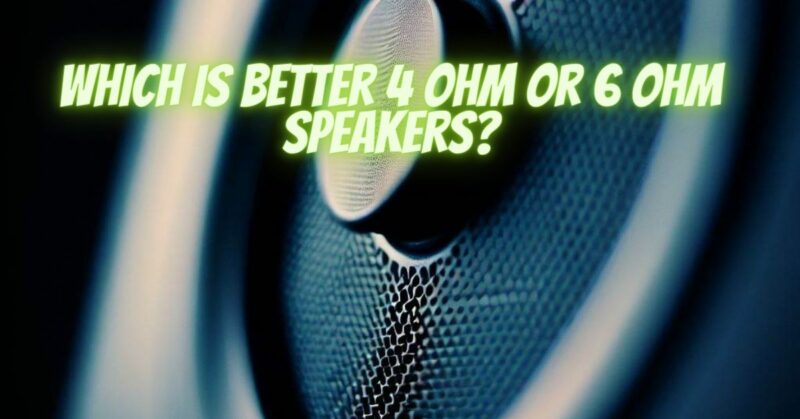When shopping for speakers, one of the specifications you’ll encounter is impedance, measured in ohms. While the differences between 4 ohm and 6 ohm speakers may seem subtle, they can have significant implications for your audio system’s performance and compatibility. Let’s delve into the characteristics of 4 ohm and 6 ohm speakers to help you determine which is better suited for your needs.
Understanding Speaker Impedance
Impedance, represented in ohms, is a measure of the resistance that a speaker presents to the electrical current from an amplifier. It influences how much power the speaker draws from the amplifier and how effectively it converts electrical signals into sound waves. While speakers are available in various impedance ratings, 4 ohm and 6 ohm speakers are commonly encountered options.
4 Ohm Speakers: Power and Efficiency
- Lower Impedance: 4 ohm speakers have lower impedance compared to 6 ohm speakers, which means they draw more electrical current from the amplifier to produce the same volume level. This increased current demand can result in higher power consumption and may require an amplifier capable of delivering sufficient current to drive the speakers effectively.
- Power Handling: Due to their lower impedance, 4 ohm speakers typically have higher power handling capabilities compared to 6 ohm speakers. They can handle more electrical power without overheating or distortion, making them suitable for use with high-power amplifiers and demanding audio applications.
- Efficiency: 4 ohm speakers are generally more efficient in converting electrical power into sound output compared to higher impedance speakers. This higher efficiency can result in louder volume levels and greater dynamic range, providing a more impactful listening experience, especially in larger rooms or outdoor settings.
6 Ohm Speakers: Compatibility and Versatility
- Moderate Impedance: 6 ohm speakers offer a middle ground between lower impedance and higher impedance speakers. They draw less current from the amplifier compared to 4 ohm speakers, which can reduce stress on the amplifier and minimize the risk of overheating or distortion, particularly with lower-powered amplifiers.
- Amplifier Compatibility: 6 ohm speakers are generally more compatible with a wider range of amplifiers compared to 4 ohm speakers. They can be used with both low-power and high-power amplifiers without requiring specialized impedance matching or adjustments, making them a versatile choice for various audio setups.
- Stability: Higher impedance speakers like 6 ohm models are often more stable when connected in parallel or in multi-speaker configurations. They present less of a load on the amplifier, reducing the risk of impedance mismatch and ensuring consistent performance across all connected speakers.
Which is Better: 4 Ohm or 6 Ohm Speakers?
The choice between 4 ohm and 6 ohm speakers depends on several factors, including your amplifier’s capabilities, your listening preferences, and your intended usage:
- Power Requirements: If you have a high-power amplifier and prioritize loud volume levels and dynamic range, 4 ohm speakers may be the preferred choice.
- Amplifier Compatibility: If you’re using a lower-powered amplifier or prefer a wider selection of amplifier options, 6 ohm speakers offer greater compatibility and versatility.
- Room Size and Acoustics: Consider the size of your listening space and the acoustic characteristics of your room. Larger rooms may benefit from the increased efficiency and power handling of 4 ohm speakers, while smaller rooms may suffice with the stability and compatibility of 6 ohm speakers.
Both 4 ohm and 6 ohm speakers have their advantages and considerations, and the choice ultimately depends on your specific requirements and preferences. Whether you prioritize power handling, amplifier compatibility, or room acoustics, understanding the characteristics of each impedance rating can help you make an informed decision when selecting speakers for your audio system. By considering factors such as amplifier capabilities, listening environment, and intended usage, you can choose the speakers that best complement your audio setup and deliver an exceptional listening experience.

